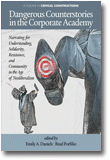
Dangerous Counterstories in The Corporate Academy
Narrating for understanding, solidarity, resistance, and community in the age of Neoliberalism
Edited by:
Emily A. Daniels, SUNY Plattsburgh
Brad J. Porfilio, Lewis University in Romeoville, IL
A volume in the series: Critical Constructions: Studies on Education and Society. Editor(s): Brad J. Porfilio, California State University, Stanislaus. Marc Pruyn, Monash University. Derek R. Ford, DePauw University.
Published 2013
Although the social reality is stark for progressive scholars who engage in scholarly activities or are committed to guiding their students to develop a social-just praxis in the circles of higher education, some scholars have found fissures amid the alienating, often hostile academic world to learn, grow, and create transformative communities. Up to this date, however, their stories have not been captured. Therefore, the purpose of this volume is to highlight alternative narratives generated by transformative scholars who have maintained their oppositional identity to the structures that oppress the vast majority of citizens. By bringing together these narratives, we focus on those who have joined with likeminded colleagues to teach, engage in activism, and conduct emancipatory forms of research, learning to negotiate and survive academic and corporate realities in spite of restrictive climates.
Not only are these stories vital for helping students, academics, and the wider community understand how commercialized forces are impacting the professional lives of critical scholars in the academy, they have the power to help current and future critical pedagogues define (and redefine) themselves in a social world which is continually “promoting a narrow and intellectually stifling agenda for the role of education and turning the public against the very idea of a critical education” (McLaren, 2006). As stated by Bruner (1986) stories give “a map of possible roles and possible worlds in which action, thought, and self-definition are possible (or desirable)” (p. 2, cited in Collins & Cooper, 2005). These possibilities for definition and redefinition are what we seek to present, explore and understand.
CONTENTS
Introduction. PART I: STUDENTS AND THE NEOLIBERAL INSTITUTION Chapter 1- Breaking the bank: Stories of financial, cultural and academic struggle from firstgeneration college students, Carrie Freie. Chapter 2- Fear in the academy, Tina Wagle. Chapter 3- Dangerous white lady, Shelley Jensen. PART II: SURVIVING THE INSTITUTION: CLASSROOM RESISTANCE(S) Chapter 4- College Curriculum as Counter Discourse: The California Immigration Semester at Occidental College, Richard Mora, Mary Christianakis, & Salvador C. Fernández. Chapter 5- A tale of the Teacher Educator and the Storyteller: Returning Stories to the Social Studies Classroom, Sarah A. Robert, Heather Killelea McEntarfer, & Karima Amin. Chapter 6- Our “excellent adventures” with NCATE: Stories of struggle, resistance, and hope, Leigh O’Brien & Sue Novinger. Chapter 7- Autoethnography and the Emergent Public: Counterstories from a Community College Classroom, Jeanne Cameron. PART III: IN THE BELLY OF THE BEAST: RADICAL SCHOLARS Chapter 8- Radical Scholar as Public Intellectual in a Marketplace of Ideas, Paul L. Thomas. Chapter 9- The Skunk in the Yogurt Cup: Postformal Academic Blues as Praxis, Tricia M. Kress. Chapter 10- The Personal is Political: Feminist Resistance to Neoliberalism in the Academy, Alison Happel. Chapter 11- How do I Keep My Ideals and Still Teach? E. Wayne Ross, Rich Gibson, Greg Queen, & Kevin D. Vinson. Chapter 12- "Won’t Back Down:” Counter-narratives of Visibility and Vulnerability in a Bleak House, William M. Reynolds. Chapter 13- Reflecting on insider/outsider critiques of teacher education, or 'don't talk about my momma', Jason Michael Lukasik & Brian D. Schultz.
REVIEWS
"In Dangerous Counterstories in the Corporate Academy: Narrating for Understanding, Solidarity, Resistance, and Community in the Age of Neoliberalism, Daniels and Porfilio have collected thirteen critical narratives that offer a wide range of experiences, analyses, and ideas for how to work within and resist the corporate academy. The edited volume contains the insightful voices of students, scholars, and activists from multiple disciplines, organizations, and institutions across North America. Explaining the purpose of the volume, Daniels and Porfilio explain that "some scholars have found fissures amid the alienating, often hostile academic world to learn, grow, cope, and create socially generative and transformative communities. Until recently, however, their stories have not been captured" (viii). Thus, by collecting and sharing these narratives, the book acts as a resource for knowledge, encouragement, and hope for other students and scholars who are resisting the anti-critical forces that encroach on their work toward social justice." Dave Wolken Syracuse University in Education Review
-
Paperback9781623961237
Web price: $45.04 (Reg. 52.99)
-
Hardcover9781623961244
Web price: $80.74 (Reg. 94.99)
- eBook9781623961251

- EDU037000 - EDUCATION: Research
- EDU029040 - EDUCATION: TEACHING METHODS & MATERIALS: Social Science
- BUS070000 - BUSINESS & ECONOMICS: INDUSTRIES: General
-
 DIY Punk as Education
From Mis‐education to Educative Healing
DIY Punk as Education
From Mis‐education to Educative Healing
-
 Imagining Education
Beyond the Logic Of Global Neoliberal Capitalism
Imagining Education
Beyond the Logic Of Global Neoliberal Capitalism
-
 Multiculturalism, Dialectical Thought, and Social Justice Pedagogy
A Study from the Borderlands
Multiculturalism, Dialectical Thought, and Social Justice Pedagogy
A Study from the Borderlands
-
 Read Aloud Handbook for Native American Children
Read Aloud Handbook for Native American Children
-
 Rethinking Social Studies
Critical Pedagogy in Pursuit of Dangerous Citizenship
Rethinking Social Studies
Critical Pedagogy in Pursuit of Dangerous Citizenship
-
 The 2017 Hampton Reader
Selected Essays from a Working-class Think Tank
The 2017 Hampton Reader
Selected Essays from a Working-class Think Tank
-
 The Luso-Anarchist Reader
The Origins of Anarchism in Portugal and Brazil
The Luso-Anarchist Reader
The Origins of Anarchism in Portugal and Brazil

